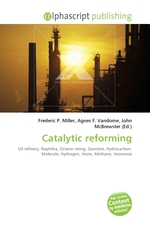Catalytic reforming
Frederic P. Miller, Agnes F. Vandome, John McBrewster
бумажная книга
Catalytic reforming is a chemical process used to convert petroleum refinery naphthas, typically having low octane ratings, into high-octane liquid products called reformates which are components of high-octane gasoline. Basically, the process re-arranges or re-structures the hydrocarbon molecules in the naphtha feedstocks as well as breaking some of the molecules into smaller molecules. The overall effect is that the product reformate contains hydrocarbons with more complex molecular shapes having higher octane values than the hydrocarbons in the naphtha feedstock. In so doing, the process separates hydrogen atoms from the hydrocarbon molecules and produces very significant amounts of byproduct hydrogen gas for use in a number of the other processes involved in a modern petroleum refinery. Other byproducts are small amounts of methane, ethane, propane and butanes. This process is quite different from and not to be confused with the catalytic steam reforming process used industrially to produce various products such as hydrogen, ammonia and methanol from natural gas, naphtha or other petroleum-derived feedstocks
Данное издание не является оригинальным. Книга печатается по технологии принт-он-деманд после получения заказа.


